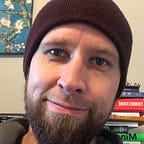Impunity on a Drug Run
This is the freedom of whiteness
Joy and I were on our way to commit a crime or two. I was driving. It was in Dalhart, a cow town with a huge famous grain elevator in the westernmost part of Texas before you cross into the northeast of New Mexico. I was pulled over for speeding. Though there were no drugs in the trunk, I was so nervous I couldn’t figure out how to pull up my insurance.
The policeman was accommodating. He asked where we were headed. Raton, I lied, to see family.
In fact, we were headed to Colorado to hike a little, buy as much marijuana as we could, and transport the drugs back to Texas where they are emphatically banned.
The cop gave me a ticket for the speeding, which was the right thing for him to do.
I felt bad for myself, having to pay a ticket. I’ve always been skeptical of police. My political views morphed firmer during a time when my father, to my mother’s horror, was in a phase of half-joking about killing cops. He has a mean antigovernment streak, my dad. Though my dad’s not a white supremacist, this phase of his was of a jagged piece with their movement. The ingrained idea that he was oppressed animated his discontent. My dad was never a rich man, though he worked hard. He blamed his poverty on the government holding him down.
I’ve learned that his state is a symptom of the American Dream, a fantasy powerful people constructed to keep the masses pacified. That fictive story has backfired on society with the presidency of Donald Trump, a cataclysm that would not be possible without the lie of the American Dream. I’ve realized this. I’ve moderated my stances. And I’m now painfully aware that despite my fumbling for documents as I sat on the side of the road in Dalhart, Texas, on a drug run, I didn’t think for one second that I would die that day.
Observing current events over the last few days, I’ve reconstructed that traffic stop in my head, imagining myself as a black man. I can’t begin to put myself in the headspace. I’ve never experienced it. I have no regular contact with black people. I live in an apartment complex with many black people. I never talk to any of them, save for a mover who lives two buildings down named Mike who always smiles and waves and strikes up a conversation with me. He seems like a lovely guy, but these conversations are never substantive.
Would I have survived that traffic stop had I been black? I could try and calculate the likelihood by extrapolating statistics and analysis and applying it to that situation. But a) I’m not smart enough for that, b) the data are not reliable, and c) it would be a futile and morbid effort.
Because the thought that counts is that, were I black, my death would have been in the back of my addled head the whole time. An unshakable leach. The physical burden of my death would have lurked like a shadow because it is always attached to a black man. I have a shadow, but I don’t know what that feels like. To have a qualification, a proviso, conjoined to me that I’ll go on to live my life if I make it out of this alive.
I drove on, Joy in the passenger seat, with the ticket in my console. I forgot about it until it came time to enroll in a defensive driving course. Meantime, Joy and I drove to Trinidad, Colorado, loaded up on weed, hiked, and drove the merchandise home. We crossed two state borders with two ounces of dispensary ganja. I set the cruise control and didn’t think about the police until we were home.
I felt free to wander. I felt free to go. I felt free commit nonviolent drug offenses. I still haven’t been to a protest. That’s the freedom of whiteness.
